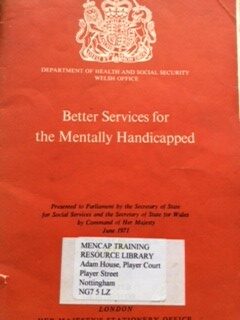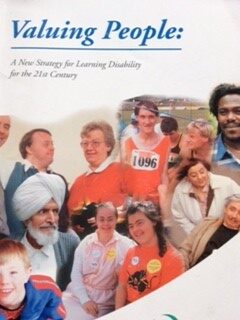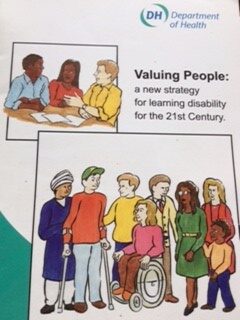 It is half a century since the white paper Better Services for the Mentally Handicapped was published in 1971. It is timely to reflect on how policy has changed in that time. Many readers will know that Better Services (Cmnd 4683) was a response to the scandal of Ely Hospital in Cardiff, where a whistleblower revealed the widespread abuse there to the News of the World newspaper. Governments then could be shamed into action in ways that have the whiff of a bygone era. It is a modest-looking publication, A5 in size, and no illustrations other than statistical tables.
It is half a century since the white paper Better Services for the Mentally Handicapped was published in 1971. It is timely to reflect on how policy has changed in that time. Many readers will know that Better Services (Cmnd 4683) was a response to the scandal of Ely Hospital in Cardiff, where a whistleblower revealed the widespread abuse there to the News of the World newspaper. Governments then could be shamed into action in ways that have the whiff of a bygone era. It is a modest-looking publication, A5 in size, and no illustrations other than statistical tables.
Its publication is remembered as the beginning of the end for long-stay hospitals as the preferred form of care for people with learning disabilities. It did not commit to their demise, but it did state that “mentally handicapped children and adults should not be segregated unnecessarily from other people of similar age, nor from the general life of the local community” (paragraph 40(ii)). Its main prescriptions were for accommodation to be provided in the community, for training centres to be set up and for local authorities, not the NHS, to be the lead agencies. Of course, these ideas are outmoded.
We now regard training centres as yet another way of segregating people, and the community units were mainly hostels housing 20 or more people. But it had some merits. It acknowledged “present services… are a far cry from our current ideals” (paragraph 193) and was a thorough attempt to document what was needed to fill the gaps in provision. Hence table 5 gave a comparison of what was being provided with what was required. For example, in 1969, there were 4,300 residential care places, and it was reckoned that 29,400 were needed. There was a timetable for meeting those needs and cost estimates – what we might now call targets.
Inevitably, the targets were missed but they did set in train a major expansion of local authority residential and daytime provision to the extent that, by the 1980s, almost every council had such facilities. And, gradually, the hospitals did begin to wind down.
Valuing People: a new dawn

 Its successor white paper, Valuing People, came out in 2001 – it is now its 20th anniversary. In contrast to Better Services, this white paper was prompted not by scandal but (I’m guessing here) by a group of advocates successfully lobbying a new minister, John Hutton, to make his name by sponsoring a strategy for learning disability.
Its successor white paper, Valuing People, came out in 2001 – it is now its 20th anniversary. In contrast to Better Services, this white paper was prompted not by scandal but (I’m guessing here) by a group of advocates successfully lobbying a new minister, John Hutton, to make his name by sponsoring a strategy for learning disability.
It felt at the time like a new dawn. It was the first policy to be co-produced with self-advocates and carers, had an easy-read version and could not look more different from Better Services: smiling people on the front cover, large print, its principles – rights, independence, choice, inclusion loudly trumpeted. And yet… although its principles stand out (you can’t miss them) its aims were far less prescriptive than those in its earlier counterpart. It is surprisingly devoid of statistics. There are few targets and those that are there seem vaguely
worded and hard to measure.
The most concrete commitment was to close NHS long-stay hospitals by 2004. In fact, that took until 2010, and some would say it has still not been fully achieved (see Impossible to improve, spring 2021). It introduced partnership boards, funded advocacy and self-advocacy – for a time. Perhaps its most lasting legacy, boosted by a revamp in 2009 with Valuing People Now, was the dismantling of the hostels and day centres set up by its predecessor in favour of community inclusion. Is it a measure of its failure that the proportion of people in paid work has fallen in the 21st century to a shameful 6%, despite employment being one of its main aspirations?
England’s policy vacuum
And what of policy now? Try googling “learning disability policy England” and what comes up is the NHS Learning Disability and Autism programme – a follow up to Transforming Care.
Given that one of the major commitments in 1971 was to place local authorities in the driving seat, it seems extraordinary that the only relic of learning disability policy since Valuing People lapsed resides in the NHS. Don’t get me wrong. The pandemic has shown how important it is to get healthcare right and there is a long way to go. But learning disability is not an illness, and people with learning disabilities need a lot more than healthcare to achieve good lives. In contrast, Wales has a five-year learning disability strategy running until 2024 with three priorities – health and wellbeing, employment and education (www.ldw.org.uk/about-us/strategic-plan). Scotland has The Keys to Life strategy,
launched in 2013, reviewed and revamped since (https://keystolife.info).
Now, I am old enough to know a policy does not guarantee change. But, without one, where are the reference points, the drive, the ambition? It is time to push the English government
to put this right – and commit to a learning disability policy fit for the mid 21st century.




